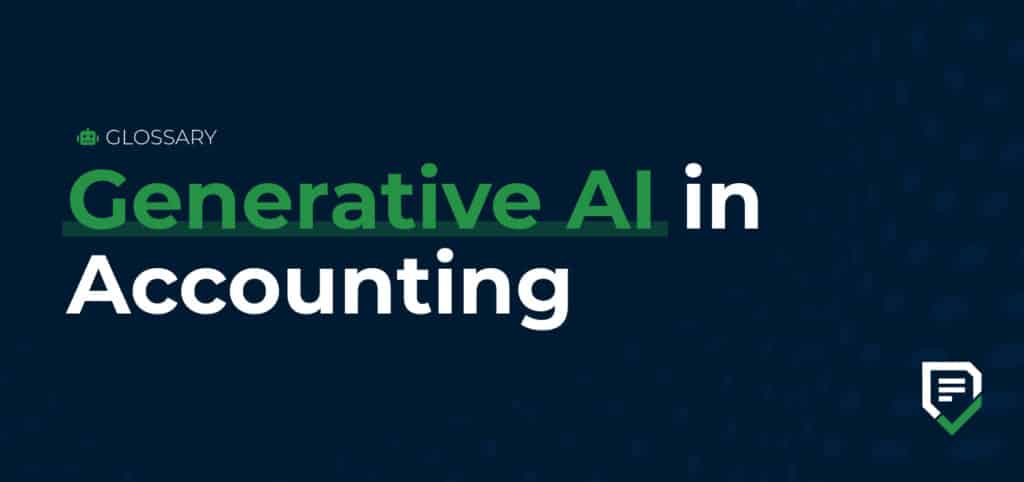The accounting industry is no stranger to change. From manual bookkeeping to digital spreadsheets and cloud-based accounting software, technology has continuously reshaped the profession.
Now, generative artificial intelligence (AI) is driving the next major transformation, changing how accountants analyze data, generate reports, make informed decisions, and provide value to clients.
What is Generative AI in Accounting?
GenAI refers to a subset of artificial intelligence that can create new content, like text, images, music, audio, and videos. For accountants, it’s useful in generating financial reports, tax summaries, audit documentation, and predictive insights.
Unlike traditional automation software that follows predefined rules, GenAI tools like ChatGPT, Gemini, and DeepSeek can learn from vast amounts of data, identify patterns, and produce intelligent outputs.
Technologies Behind Generative AI
Here are some advanced technologies powering Generative AI.
1. Machine Learning (ML)
Machine learning algorithms enable AI models to learn from historical financial data, recognize patterns, and improve over time. It also helps with fraud detection, predictive analytics, and automated reporting by analyzing trends in transactions and financial records.
2. Natural Language Processing (NLP)
NLP allows AI to understand, process, and generate human-like text. This is essential for automating financial reporting, tax documentation, and audit summaries. It also enables AI-driven chatbots to assist clients.
3. Deep Learning
A subset of ML, deep learning uses neural networks to process complex financial data. It enhances AI’s ability to detect anomalies, assess risks, and automate complex calculations accurately.
4. Large Language Models (LLMs)
LLMs, such as GPT-4o, power AI-driven accounting tools by generating context-aware financial insights, reports, and documentation. These models improve decision-making, compliance analysis, and financial forecasting through intelligent text generation.
5. Generative Adversarial Networks (GANs)
GANs consist of two AI models: one generates data, and the other evaluates it for accuracy. In accounting, GANs can analyze vast datasets to simulate financial scenarios, stress-test financial models, and detect fraudulent activities.
GenAI Applications in Accounting
1. Automated Financial Reporting
Generative AI can create financial statements, audit reports, and tax summaries for clients. For example, you can set up the system to get data on client sales, expenses, and taxes. Within minutes, it can produce a detailed report with visuals and analyses that show critical financial metrics and trends. This process saves time and improves the report’s accuracy.
2. Fraud Detection & Risk Management
GenAI algorithms can detect irregular patterns, unusual transactions, and potential fraud by analyzing large datasets in real time. This helps you identify risks before they become major financial threats.
3. AI-powered Audit Automation
AI-driven tools can scan thousands of financial records in seconds to identify discrepancies, reducing reliance on traditional audit sampling. This improves audit efficiency, accuracy, and compliance.
5. Tax Compliance & Optimization
Tax season can be overwhelming, but AI helps ease the burden. According to the Thomson Reuters Tax Firms Report, 47% of tax professionals are excited or hopeful about GenAI’s potential to boost efficiency and productivity. The reason isn’t far-fetched.
AI can automate complex tax calculations, spot deductions, and keep up with changing tax laws. Beyond these, it can quickly generate tax reports, flag potential audit risks, and suggest ways to reduce tax liabilities.
6. Client Advisory
With AI-generated insights, you can provide tailored financial advice to clients, helping them optimize cash flow, investments, and business strategies.
For instance, you may uncover growing revenue streams or pinpoint areas to reduce expenses. This can transform your client relationship and position you as a strategic advisor.
7. Personalized Client Communication
Imagine an automated assistant that can draft personalized client responses, send tax reminders, and provide customized financial insights. That’s the power of GenAI.
You can integrate it with your accounting software to streamline client communication, save time, and improve workflow efficiency.
For instance, Financial Cents’ ChatGPT integration enables you to craft emails and create workflow templates in seconds.
Why Use Generative AI in Accounting?
Here are some benefits of integrating GenAI into your accounting processes.
1. Increased Efficiency
In our State of Accounting Automation Workflow report, 66.1% of firm owners consider recurring task automation the most valuable feature in a workflow system. And for good reason: AI-powered tools can streamline repetitive accounting tasks like invoice processing, tax calculations, and financial reporting. By automating these workflows, you can save time, reduce manual work, and boost productivity,
2. Enhanced Accuracy
Repetitive manual tasks like manual data entry, report generation, and journal entries can lead to errors, making it both costly and time-consuming to fix. However, automating these tasks minimizes mistakes, leading to more accurate financial reporting.
3. Faster Decision-Making
GenAI can analyze large datasets in seconds and provide real-time financial insights for better forecasting, budgeting, and planning. It can also identify trends, anomalies, or discrepancies in your financial reports.
4. Cost Savings
Looking to reduce costs without sacrificing quality? Enter GenAI. It can take over routine tasks like data entry, reconciliations, and reporting, cutting down on labor expenses. It also helps minimize expenses associated with costly errors, audits, and compliance violations.
5. Competitive Advantage
Today’s clients are particular about quality, speed, and efficiency. This shows the importance of leveraging AI in your firm to speed up workflows, meet deadlines, and offer real-time data analysis. This enables you to provide excellent client accounting services and stand out among competition.
Best Practices for Integrating Generative AI in Your Firm
Here are some tips to help you integrate generative AI into your accounting practices.
- Identify Key Use Cases: Determine where AI can add the most value, such as data entry, tax preparation, financial reporting, invoice processing, or fraud detection.
- Select the Right AI Platform: Research GenAI tools and platforms that align with your needs, budget, and technical capabilities. Prioritize user-friendliness, scalability, ease of integration, and vendor support.
- Ensure Data Quality: AI models rely on accurate data. Regularly clean and validate financial data to improve AI performance and reliability.
- Maintain Compliance & Security: Adhere to data privacy laws, such as GDPR, CCPA and enact strong security measures to protect sensitive financial information.
- Invest in Training & Upskilling: Provide hands-on training programs to ensure your team has the skills and knowledge to use AI software.
- Monitor & Optimize AI Performance: Continuously track AI outputs to detect biases or inaccuracies and adjust for better results.
- Integrate with Existing Accounting Software: To maximize AI’s efficiency, ensure the tool is compatible with accounting platforms like Financial Cents, QuickBooks, and Xero.
GenAI in Accounting Bottlenecks
Here are some common risks associated with implementing GenAI in your firm.
Data Security & Privacy Concerns
Data security is a top priority for accounting professionals, with 65% of accounting and tax firm owners citing it as a major barrier to their AI adoption. Their concerns are valid because AI-powered accounting tools handle confidential information, including tax records, payroll details, and client financial statements. Without adequate security, these systems could be vulnerable to data breaches, hacking attempts, or unauthorized access.
Despite these risks, you can safely implement AI in your firm by partnering with reputable providers to implement strong cybersecurity measures, such as encryption, multi-factor authentication, and access codes.
Compliance Issues
GenAI models learn from historical data, raising concerns about data storage, compliance with relevant regulations (such as GDPR and CCPA), and ethical use.
To overcome these risks, create clear AI guidelines and policies to comply with legal and regulatory requirements. Also, regularly review and update these policies to stay current with changes in the law.
Inaccurate Data
According to QuickBooks’ Accountant Technology Survey, 21% of respondents ranked accuracy as their biggest AI concern. While AI can automate complex accounting tasks, it still relies on the quality of the data it processes. Inaccurate or incomplete data can lead to errors in financial reports, miscalculations, and compliance issues.
As such, it’s essential to input data that is well-structured, validated, and regularly audited. Also, implement data quality controls and integrate AI with reliable accounting systems to maintain accuracy and build trust.
Compatibility
Many legacy systems lack API support, cloud infrastructure, or real-time data processing capabilities. This makes it difficult to leverage AI’s full potential.
For a smooth adoption, assess your current accounting tech stack, choose AI solutions with API integration, and work with IT teams to address compatibility gaps.
Future-Proof Your Firm with GenAI
The future of accounting is here, and firms that embrace generative AI will have a clear advantage. However, AI isn’t a threat to accountants; instead, it will enhance your capabilities. By automating repetitive tasks, reducing human errors, and providing deep insights, AI frees up time for a more strategic and advisory role.
Use Financial Cents AI integration to streamline workflows, save time, and stay productive.



